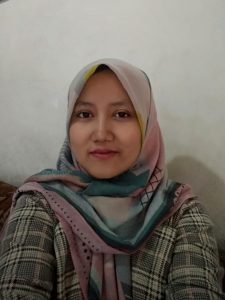Welcome from the Head of Garment Production Major

Karlina Somantri, S.ST., M.M.
Assalamualaikum wr. wb.
Praise be to Allah the Almighty and the Most Willing, may protection and grace always be with us all. Even in the midst of the limitations caused by the Covid-19 outbreak, we express our praise and gratitude for the disclosure of information regarding the Major of Garment Production and Garment Production Concentration of Fashion Design through the provision of a website page that specifically contains information about academic, laboratory, extracurricular activities, scientific articles and others. Thank you to the entire management of Bandung Polytechnic of Textile Technology for the support that has been given, also to all lecturers, education staff, alumni, students and all parties who will work together to contribute to the development of the content of this website.
The focus of the study in the Garment Production Major is to learn about the engineering of the garment production process. Core skills such as manual pattern making and Computer Assisted Design (CAD) techniques, pattern grading, analysis of cutting & material utilization, sewing techniques and analysis of garment machine selection will be acquired by students in this major, including the study of motion and time.
The Garment Production study program began its education in 2005. The opening of this study program was based on the increasing demand for labor in the garment sector. The Garment Production study program then developed and opened a Fashion Design concentration in 2009.
In 2015 STTT changed to Bandung Polytechnic of Textile Technology on the basis of organizational arrangement and work procedures for higher vocational education units within the Ministry of Industry which included changing STTT to Bandung Polytechnic of Textile Technology as approved by the Minister for Administrative Reform and Bureaucratic Reform through letter Number B /5782/M.PAN-RB/12/2014 and the permit for the implementation of the Diploma Four Bandung Polytechnic of Textile Technology Study Program through the Decree of the Minister of Education and Culture No. 497/E/2014. With this change, the curriculum of the study program is readjusted and graduates from the Garment Production study program will receive a Bachelor of Applied Business degree.
The Garment Production study program in 2016 has received accreditation A, according to the decision of BAN PT RI 2445/SK/BAN-PT/Akred/Dipl-IV/X/2016.
Establishing the Garment Production Study Program as a reference and information center in the implementation and development of education and training in the field of garment production expertise as well as in handling problems related to operations and the development of the Textile Industry and Textile Product and its supporting industries.
Lecture students to become garment experts according to their needs, carry out applied and scientific research in order to help solve problems or develop the textile industry and textile products
The profile or characteristics of graduates of the Garment Production study program are able to manage the garment production process, starting from planning work, raw materials, human resources, calculating production costs and selecting machines that will be used in the garment production process, besides that graduates are able to maintain and control product quality. produced in addition to evaluating garment production results and solving problems when necessary. Able to follow and apply the latest developments in science and technology in the garment industry, and able to read business opportunities in the garment sector.
Graduates of the study program can have a career in the field and job positions of technicians at the middle management level in the textile spinning, knitting, weaving, non-woven industries in the Production and Textile Testing Institute, Machine Maintenance, Research and Development, PPIC and Quality Control sections. As a technician in the textile industry, the graduate is not only capable of designing but also solving engineering problems in the textile industry.
